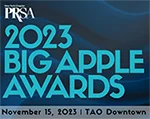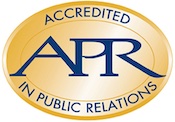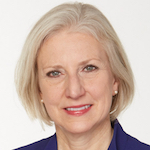Blake Lewis is opposing Mark McClennan for chair-elect of PRSA—the first contested election since 2000. The battle of Joann Killeen and Art Stevens in 2000 generated charges of impropriety.
Burning questions present themselves to the two candidates and we hope they will answer them.
 Lewis, McClennan |
The New York chapter's Sept. 8 webinar on ethics showed that inexpensive technology is available for "live," real time broadcasting of events.
A question for national is why hasn't this been used for the Assembly in recent years? The Society says it is dedicated to the "free flow of accurate and truthful information" so there can be "informed decision making in a democratic society."
Below are some of the issues the candidates should face. The presentations of McClennan to the nomcom and Lewis are bereft of any opinions on such subjects. They pledge to work on membership growth and diversity and laud social media and the use of technology but fail to address key Society issues.
A question for Lewis, currently secretary, is what issues made you toss your hat in the ring? Lewis in 2007 headed a"Committee of 50" Society leaders that got the Assembly to pass a resolution demanding "transparency, complete openness" by the Society's board and staff. The committee also attacked the problem of the "severe shortage" of candidates for national offices.
Here are other questions for both:
1. Do you favor setting up one or more live webinars, a la the New York chapter, at which members and the press can question you between now and Oct. 11?
2. Do you favor allowing the entire membership, after hearing your views on key subjects, to pick by secure e-mail voting, one of you as chair-elect? The free Condorcet system of Cornell has been used by thousands of organizations for this purpose for many years.
3. Do you favor immediate removal from the bylaws of APR as a condition for any office or committee? The Assembly has the power to do this, over-riding any bylaws about prior notification. Current proposal is to open two at-large seats on the 17-member national board to non-APRs if they have 20 years in PR or have held Society leadership posts.
4. Do you favor returning the titles of president and CEO to members and removing them from the staff?
5. Will you let reporters again cover the Assembly? Will you support removal of the boycott against O'Dwyer reporters at the national conference and the bar against an exhibit of the six O'Dwyer informational products?
6. Will you align the Society with groups such as the AMA, ABA, AICPA an ASAE by deferring about half of your dues instead of booking them as cash, bloating "net assets?" Members pay $300K yearly for CFO/CPA reports that are minimally informative. Members need to work at h.q. to see how their money is spent.
APRs from the South Support Lewis
 Killeen, Stevens |
Lewis, who has headed his own firm in Dallas since 2000, submitted 21 signatures to Society h.q. Sept. 11, the last day for such petitions. The last minute submission allowed Lewis to build support secretly without tipping off McClennan's allies.
All of the signers are from the South or Southwest -- five from the Dallas chapter; six from Houston, and others from Arkansas, Georgia, Fort Worth, Oklahoma City and Tulsa. Delegate-at-large Shirley Serini is a PR prof at Valdosta State University, Georgia.
The Dallas chapter is a hotbed of APR -- 13 of the 17 board members, including president Leah Williams, VP Sandra Duhe and treasurer Jeff Smith, holding that designation.
At the Boston chapter of McClennan, only two of the 19 leaders listed on the website are APR. Not APR are the four top officers -- president Julie Dennehy, president-elect Josh Gitelson, secretary Erin Caron and treasurer Edna Kaplan.
Only three of the 31 New York officers and other leaders are APR, which helps to account for the low standing of New Yorkers with national leadership and the staff.
Society Leaders Alienated from Members
Both chapters and national have a poor record of listening to or even asking members about major topics.
New York h.q. was moved downtown in 2004 with no input from either the members or the Assembly.
Ditching the printed members' directory was made in 2005 with no consultation with members or any vote in the Assembly. Society leaders and staff refuse to discuss the possibility of a PDF of the directory which would put printing costs in the hands of members.
Boston's Vote to Ditch APR Ignored
The Boston chapter's 400 members in 2010 voted by a 61% margin to remove APR from the national bylaws. The question was put to them after the Committee for a Democratic PRSA, headed by Richard Edelman, Art Stevens and Dave Rickey, proposed a bylaw allowing non-APRs to run for office for the first time since the 1970s.
McClennan, then a director and Assembly delegate of the chapter, enraged Stevens by saying that the board "has not yet decided what we will do with the delegates" on that issue.
"Why is not a popular answer to a question not always the solution?" asked Stevens. "Can you simply ignore what members say and want…what happened to democracy?"
None of the other 109 chapters put the issue to their members for a binding vote.
Ethical Abuses Charged in 2000 Election
Stevens, the official candidate for chair-elect in 2000, who was opposed from the floor by Joann Killeen, charged that he lost the nomination because of unethical influence by the board.
Nine of the 17 sitting board members signed the petition for Killeen, touching off charges of improper influence by 1987 president Jack Felton. He said that under the bylaws, directors are not supposed to be involved in picking officers or directors. That function is carried out only by the nomcom, he said.
Killeen, in her presentation to the 2000 Assembly, emphasized her strong support of APR.
Stevens, an ardent foe of the APR rule for national office, favored the annual conference being in New York every second or third year and also wanted the entire list of Assembly delegates to be reachable by one e-mail.
Lewis's battle against McClennan is a battle of believers in APR vs. non-believers-- a battle of the South vs. the North.
Joe Cohen of New York as 2014 chair, from a chapter with little regard for APR, is enough Northeast representation for the moment, reason the Southerners. There's no need for another Northerner such as McClennan, whose chapter also shows little interest in APR, they feel.


 PRSA-NY today announced its five honorary co-chairs for its Big Apple Awards ceremony gala slated for TAO Downtown on Nov. 15.
PRSA-NY today announced its five honorary co-chairs for its Big Apple Awards ceremony gala slated for TAO Downtown on Nov. 15. PRSA-NY president Carmella Glover today issued a "heartfelt apology" on behalf of the chapter for her Oct. 14 message that "caused disappointment and hurt to some of our valued members."
PRSA-NY president Carmella Glover today issued a "heartfelt apology" on behalf of the chapter for her Oct. 14 message that "caused disappointment and hurt to some of our valued members." The leadership of Public Relations Society of America is backing a move to change the current “must-have” APR accreditation to “strongly preferred” as a requirement for a seat on its board of directors.
The leadership of Public Relations Society of America is backing a move to change the current “must-have” APR accreditation to “strongly preferred” as a requirement for a seat on its board of directors. Public Relations Society of American today named Linda Thomas Brooks CEO, succeeding CFO Phil Bonaventura, interim chief since July 2019.
Public Relations Society of American today named Linda Thomas Brooks CEO, succeeding CFO Phil Bonaventura, interim chief since July 2019.


 Have a comment? Send it to
Have a comment? Send it to 
No comments have been submitted for this story yet.